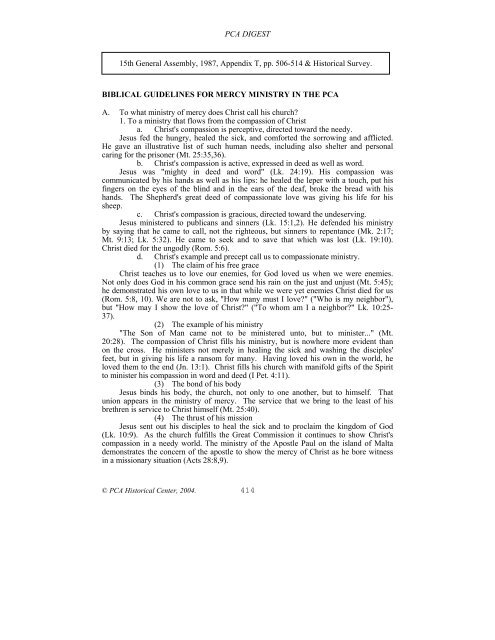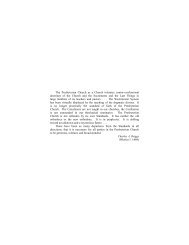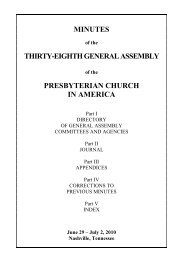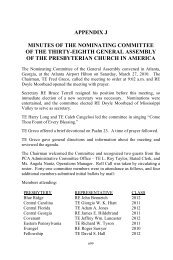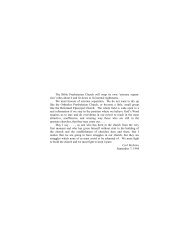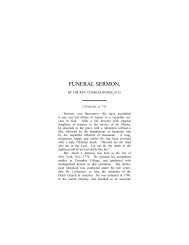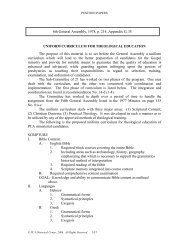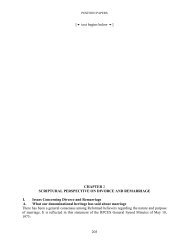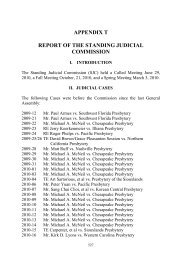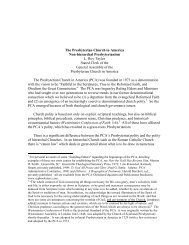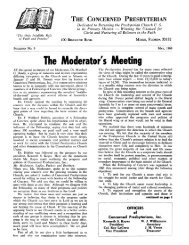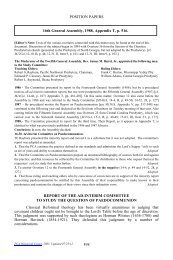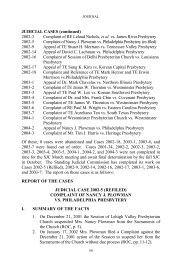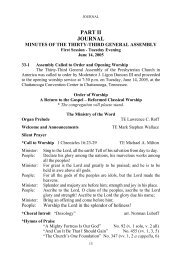Biblical Guidelines for Mercy Ministry in the PCA - PCA Historical ...
Biblical Guidelines for Mercy Ministry in the PCA - PCA Historical ...
Biblical Guidelines for Mercy Ministry in the PCA - PCA Historical ...
Create successful ePaper yourself
Turn your PDF publications into a flip-book with our unique Google optimized e-Paper software.
<strong>PCA</strong> DIGEST<br />
15th General Assembly, 1987, Appendix T, pp. 506-514 & <strong>Historical</strong> Survey.<br />
BIBLICAL GUIDELINES FOR MERCY MINISTRY IN THE <strong>PCA</strong><br />
A. To what m<strong>in</strong>istry of mercy does Christ call his church<br />
1. To a m<strong>in</strong>istry that flows from <strong>the</strong> compassion of Christ<br />
a. Christ's compassion is perceptive, directed toward <strong>the</strong> needy.<br />
Jesus fed <strong>the</strong> hungry, healed <strong>the</strong> sick, and com<strong>for</strong>ted <strong>the</strong> sorrow<strong>in</strong>g and afflicted.<br />
He gave an illustrative list of such human needs, <strong>in</strong>clud<strong>in</strong>g also shelter and personal<br />
car<strong>in</strong>g <strong>for</strong> <strong>the</strong> prisoner (Mt. 25:35,36).<br />
b. Christ's compassion is active, expressed <strong>in</strong> deed as well as word.<br />
Jesus was "mighty <strong>in</strong> deed and word" (Lk. 24:19). His compassion was<br />
communicated by his hands as well as his lips: he healed <strong>the</strong> leper with a touch, put his<br />
f<strong>in</strong>gers on <strong>the</strong> eyes of <strong>the</strong> bl<strong>in</strong>d and <strong>in</strong> <strong>the</strong> ears of <strong>the</strong> deaf, broke <strong>the</strong> bread with his<br />
hands. The Shepherd's great deed of compassionate love was giv<strong>in</strong>g his life <strong>for</strong> his<br />
sheep.<br />
c. Christ's compassion is gracious, directed toward <strong>the</strong> undeserv<strong>in</strong>g.<br />
Jesus m<strong>in</strong>istered to publicans and s<strong>in</strong>ners (Lk. 15:1,2). He defended his m<strong>in</strong>istry<br />
by say<strong>in</strong>g that he came to call, not <strong>the</strong> righteous, but s<strong>in</strong>ners to repentance (Mk. 2:17;<br />
Mt. 9:13; Lk. 5:32). He came to seek and to save that which was lost (Lk. 19:10).<br />
Christ died <strong>for</strong> <strong>the</strong> ungodly (Rom. 5:6).<br />
d. Christ's example and precept call us to compassionate m<strong>in</strong>istry.<br />
(1) The claim of his free grace<br />
Christ teaches us to love our enemies, <strong>for</strong> God loved us when we were enemies.<br />
Not only does God <strong>in</strong> his common grace send his ra<strong>in</strong> on <strong>the</strong> just and unjust (Mt. 5:45);<br />
he demonstrated his own love to us <strong>in</strong> that while we were yet enemies Christ died <strong>for</strong> us<br />
(Rom. 5:8, 10). We are not to ask, "How many must I love" ("Who is my neighbor"),<br />
but "How may I show <strong>the</strong> love of Christ" ("To whom am I a neighbor" Lk. 10:25-<br />
37).<br />
(2) The example of his m<strong>in</strong>istry<br />
"The Son of Man came not to be m<strong>in</strong>istered unto, but to m<strong>in</strong>ister..." (Mt.<br />
20:28). The compassion of Christ fills his m<strong>in</strong>istry, but is nowhere more evident than<br />
on <strong>the</strong> cross. He m<strong>in</strong>isters not merely <strong>in</strong> heal<strong>in</strong>g <strong>the</strong> sick and wash<strong>in</strong>g <strong>the</strong> disciples'<br />
feet, but <strong>in</strong> giv<strong>in</strong>g his life a ransom <strong>for</strong> many. Hav<strong>in</strong>g loved his own <strong>in</strong> <strong>the</strong> world, he<br />
loved <strong>the</strong>m to <strong>the</strong> end (Jn. 13:1). Christ fills his church with manifold gifts of <strong>the</strong> Spirit<br />
to m<strong>in</strong>ister his compassion <strong>in</strong> word and deed (I Pet. 4:11).<br />
(3) The bond of his body<br />
Jesus b<strong>in</strong>ds his body, <strong>the</strong> church, not only to one ano<strong>the</strong>r, but to himself. That<br />
union appears <strong>in</strong> <strong>the</strong> m<strong>in</strong>istry of mercy. The service that we br<strong>in</strong>g to <strong>the</strong> least of his<br />
brethren is service to Christ himself (Mt. 25:40).<br />
(4) The thrust of his mission<br />
Jesus sent out his disciples to heal <strong>the</strong> sick and to proclaim <strong>the</strong> k<strong>in</strong>gdom of God<br />
(Lk. 10:9). As <strong>the</strong> church fulfills <strong>the</strong> Great Commission it cont<strong>in</strong>ues to show Christ's<br />
compassion <strong>in</strong> a needy world. The m<strong>in</strong>istry of <strong>the</strong> Apostle Paul on <strong>the</strong> island of Malta<br />
demonstrates <strong>the</strong> concern of <strong>the</strong> apostle to show <strong>the</strong> mercy of Christ as he bore witness<br />
<strong>in</strong> a missionary situation (Acts 28:8,9).<br />
© <strong>PCA</strong> <strong>Historical</strong> Center, 2004. 414
POSITION PAPERS<br />
e. Christ's Spirit conveys his compassion<br />
At <strong>the</strong> heart of <strong>the</strong> m<strong>in</strong>istry of compassion is <strong>the</strong> love of Christ. The gifts of <strong>the</strong><br />
Spirit equip us <strong>for</strong> m<strong>in</strong>istry, but our motivation spr<strong>in</strong>gs from <strong>the</strong> love of God poured out<br />
<strong>in</strong> our hearts, as we are drawn to love him who first loved us (Rom. 5:5; 1 Jn. 4:19).<br />
2. To a m<strong>in</strong>istry def<strong>in</strong>ed by <strong>the</strong> k<strong>in</strong>gdom/gospel of Christ<br />
a. A m<strong>in</strong>istry of hope<br />
(1) Deeds of mercy po<strong>in</strong>t to <strong>the</strong> gospel promise<br />
Jesus' miracles were signs of <strong>the</strong> k<strong>in</strong>gdom, pledges of <strong>the</strong> time of <strong>the</strong> restoration<br />
of all th<strong>in</strong>gs. Our deeds of mercy <strong>in</strong> Christ's name do not have <strong>the</strong> au<strong>the</strong>nticat<strong>in</strong>g power<br />
of his miracles, but <strong>the</strong>y do po<strong>in</strong>t <strong>in</strong> hope to <strong>the</strong> consummation triumph of God's sav<strong>in</strong>g<br />
mercy.<br />
(2) Deeds of mercy provide a <strong>for</strong>etaste of God's goodness<br />
Our deeds of mercy have a double implication: <strong>the</strong>y po<strong>in</strong>t <strong>for</strong>ward to <strong>the</strong><br />
promise of <strong>the</strong> new heavens and earth; <strong>the</strong>y also show <strong>the</strong> beg<strong>in</strong>n<strong>in</strong>g of <strong>the</strong> fulfillment<br />
of <strong>the</strong> promise <strong>in</strong> <strong>the</strong> pour<strong>in</strong>g out of <strong>the</strong> love of Christ through <strong>the</strong> Spirit. Visit<strong>in</strong>g <strong>the</strong><br />
prisoner is an example of this: we m<strong>in</strong>ister hope to <strong>the</strong> prisoner, <strong>for</strong> we proclaim <strong>the</strong><br />
liberty to <strong>the</strong> captives that Christ will br<strong>in</strong>g (Lk. 4:18). While <strong>the</strong> f<strong>in</strong>al day of Christ's<br />
jubilee is yet to come, it is already present <strong>in</strong> <strong>the</strong> sav<strong>in</strong>g power of Christ's Spirit.<br />
b. A m<strong>in</strong>istry <strong>in</strong> Christ's name<br />
(1) Christ's church must confess his name<br />
"There is no o<strong>the</strong>r name under heaven given among men by which we must be<br />
saved" (Acts 4:12). Peter's proclamation of <strong>the</strong> sav<strong>in</strong>g power of Christ's name follows<br />
his heal<strong>in</strong>g <strong>in</strong> <strong>the</strong> name of Jesus. In response to Peter's apostolic confession of his<br />
name, Jesus spoke <strong>the</strong> foundational words of <strong>the</strong> church's charter (Mt. 16:18). To fail<br />
to confess Christ's name be<strong>for</strong>e men is to deny him (Mt. 10:32,33). In its m<strong>in</strong>istry of<br />
mercy, as <strong>in</strong> all its life and m<strong>in</strong>istry, <strong>the</strong> church must name <strong>the</strong> name of Christ (Mk.<br />
9:37-41; cf. Mt. 10:42).<br />
(2) The m<strong>in</strong>istry of mercy is an offer<strong>in</strong>g of praise<br />
The sacrificial system of <strong>the</strong> Old Testament is fulfilled <strong>in</strong> Jesus Christ, who put<br />
away s<strong>in</strong> by <strong>the</strong> sacrifice of himself. In thankful praise, we br<strong>in</strong>g to him <strong>the</strong> offer<strong>in</strong>g of<br />
ourselves and all that we have (Rom. 12:1,2). We have <strong>the</strong> privilege of stewardship,<br />
us<strong>in</strong>g <strong>for</strong> his glory our time and possessions. The risen body of Christ is not with us so<br />
that we might ano<strong>in</strong>t his feet, but we have <strong>the</strong> poor with us, to serve <strong>in</strong> his name (Jn.<br />
12:8). Paul shows how <strong>the</strong> offer<strong>in</strong>g <strong>for</strong> <strong>the</strong> poor sa<strong>in</strong>ts <strong>in</strong> Jerusalem abounds to <strong>the</strong><br />
praise of God (2 Cor. 9:12-15). The m<strong>in</strong>istry of <strong>the</strong> Philippian church to <strong>the</strong> apostle's<br />
needs is "a sweetsmell<strong>in</strong>g aroma, an acceptable sacrifice, well pleas<strong>in</strong>g to God" (Phil.<br />
4:18). The author of Hebrews describes <strong>the</strong> sacrifice of praise of <strong>the</strong> New Covenant:<br />
first, <strong>the</strong> fruit of our lips, <strong>the</strong>n, "to do good and to share" (Heb. 13:15,16).<br />
c. A m<strong>in</strong>istry that calls to repentance and faith<br />
(1) The focus of <strong>the</strong> k<strong>in</strong>gdom cannot be blurred<br />
John <strong>the</strong> Baptist prepared <strong>the</strong> way <strong>for</strong> <strong>the</strong> com<strong>in</strong>g of Jesus by preach<strong>in</strong>g<br />
repentance because <strong>the</strong> k<strong>in</strong>gdom was at hand. Jesus called his disciples to seek first <strong>the</strong><br />
k<strong>in</strong>gdom of God and his righteousness, trust<strong>in</strong>g <strong>in</strong> <strong>the</strong> Fa<strong>the</strong>r to provide <strong>for</strong> our needs<br />
(Mt. 6:33). In all its life, <strong>the</strong> church must hold to <strong>the</strong> priority of <strong>the</strong> k<strong>in</strong>gdom (Rom.<br />
14:17; 1 Cor. 7:29,30). The car<strong>in</strong>g m<strong>in</strong>istry of <strong>the</strong> church is <strong>in</strong> <strong>the</strong> context of k<strong>in</strong>gdom<br />
manifestation and witness.<br />
415
<strong>PCA</strong> DIGEST<br />
(2) The demand of <strong>the</strong> k<strong>in</strong>gdom cannot be ignored.<br />
Jesus called to repentance and faith those whom he healed ("Your s<strong>in</strong>s are<br />
<strong>for</strong>given" Mk. 2:5; "S<strong>in</strong> no more" Jn. 5:14). The witness implicit <strong>in</strong> <strong>the</strong> m<strong>in</strong>istry of<br />
mercy must be acknowledged. <strong>Mercy</strong> flows to <strong>the</strong> undeserv<strong>in</strong>g, but not <strong>in</strong>def<strong>in</strong>itely to<br />
<strong>the</strong> unaccept<strong>in</strong>g and reject<strong>in</strong>g. The coals of fire heaped on <strong>the</strong> head of an enemy should<br />
move him to shame and sorrow, but <strong>the</strong> overtures of gracious love may be rejected.<br />
God's common grace and his sav<strong>in</strong>g mercy must be dist<strong>in</strong>guished, and even his<br />
common grace may be withdrawn <strong>in</strong> judgment: drought <strong>in</strong>terrupts <strong>the</strong> ra<strong>in</strong> fall<strong>in</strong>g on<br />
<strong>the</strong> just and <strong>the</strong> unjust. The disciples are to shake off <strong>the</strong> dust of <strong>the</strong>ir feet as a<br />
testimony aga<strong>in</strong>st those who will not receive <strong>the</strong>ir message (Mt. 10:14). Jesus worked<br />
few miracles <strong>in</strong> Nazareth because of <strong>the</strong>ir unbelief (Mt. 13:58).<br />
(3) The bless<strong>in</strong>g of <strong>the</strong> k<strong>in</strong>gdom must be represented<br />
The witness of deeds of mercy is to <strong>the</strong> love of God, not to <strong>the</strong> goodness of <strong>the</strong><br />
benevolent. We seek to show by deed as by word <strong>the</strong> bless<strong>in</strong>g of <strong>the</strong> gospel promise<br />
(Matt.5:16).<br />
d. A m<strong>in</strong>istry of Christian fellowship<br />
(1) A mutual m<strong>in</strong>istry of shar<strong>in</strong>g is required by <strong>the</strong> nature of<br />
Christian fellowship<br />
"Sa<strong>in</strong>ts, by profession, are bound to ma<strong>in</strong>ta<strong>in</strong> an holy fellowship and<br />
communion <strong>in</strong> <strong>the</strong> worship of God, and <strong>in</strong> per<strong>for</strong>m<strong>in</strong>g such o<strong>the</strong>r spiritual services as<br />
tend to <strong>the</strong>ir mutual edification; as also <strong>in</strong> reliev<strong>in</strong>g each o<strong>the</strong>r <strong>in</strong> outward th<strong>in</strong>gs,<br />
accord<strong>in</strong>g to <strong>the</strong>ir several abilities and necessities. Which communion, as God offereth<br />
opportunity, is to be extended unto all those who <strong>in</strong> every place call upon <strong>the</strong> name of<br />
<strong>the</strong> Lord Jesus." (WCF XXVI:2)<br />
(2) Ordered <strong>in</strong> <strong>the</strong> structure of fellowship<br />
Christ has ordered <strong>the</strong> fellowship of his church to provide <strong>for</strong> mutual m<strong>in</strong>istry<br />
through <strong>the</strong> stewardship of his gifts <strong>in</strong> <strong>the</strong> bond of love (1 Pet. 4:10-11). Christians<br />
m<strong>in</strong>ister to Christ and to one ano<strong>the</strong>r.<br />
(3) Expressive of <strong>the</strong> welcome to fellowship<br />
"Abound <strong>in</strong> love on toward ano<strong>the</strong>r, and toward all men" (1 Thes. 3:12; 5:15).<br />
"While we have opportunity, let us work that which is good toward all men, especially<br />
toward <strong>the</strong>m that are of <strong>the</strong> household of faith" (Gal. 6:10). (Malista, "especially"<br />
sometimes def<strong>in</strong>es a class more particularly ra<strong>the</strong>r than s<strong>in</strong>gl<strong>in</strong>g out a sub-class. It may<br />
<strong>the</strong>n be translated, "that is," as <strong>in</strong> 1 Tim. 4:10; 5:8, and probably Acts 26:3. See T. C.<br />
Skeat, "`Especially <strong>the</strong> Parchments': a Note on 2 Timothy IV. 13" Journal of Theological<br />
Studies, Vol. 30, April, 1979, pp.173-177. In view of <strong>the</strong> Thessalonians passages,<br />
however, <strong>the</strong> translation, "especially" seems better <strong>for</strong> Gal. 6:10). "Do<strong>in</strong>g good" refers<br />
to deeds of benevolence (2 Cor. 9:8; Acts 9:36; Rom. 2:5-10; 2 Thes. 3:13).<br />
Benevolence toward those outside <strong>the</strong> covenant is evident <strong>in</strong> <strong>the</strong> O.T. charge to care <strong>for</strong><br />
"strangers" Lev. 19:18,34) and <strong>in</strong> <strong>the</strong> apostolic m<strong>in</strong>istry (Acts 3:1-10; 14:8-10; 16:16-<br />
18; 19:11-13; 28:8-10; cf. Mk. 7:24-30).<br />
e. A m<strong>in</strong>istry <strong>in</strong> spiritual power<br />
(1) Our weapons are spiritual, not temporal<br />
Although material benefits are offered <strong>in</strong> diaconal service (food, cloth<strong>in</strong>g,<br />
medic<strong>in</strong>es, shelter, care), <strong>for</strong>ce is not appropriate, nor are material <strong>in</strong>ducements offered<br />
to secure acquiescence ("rice-Christians"). The church cannot deliver <strong>the</strong> oppressed by<br />
us<strong>in</strong>g <strong>for</strong>ce aga<strong>in</strong>st <strong>the</strong> oppressor (Lk. 7:19-23; Jn. 18:36; 2 Cor. 10:4).<br />
© <strong>PCA</strong> <strong>Historical</strong> Center, 2004. 416
POSITION PAPERS<br />
(2) Our objectives are spiritual, not temporal<br />
S<strong>in</strong>ce we are called to m<strong>in</strong>ister <strong>in</strong> <strong>the</strong> period between <strong>the</strong> first and second com<strong>in</strong>g<br />
of Christ, we recognize that "<strong>the</strong> <strong>for</strong>m of this world is pass<strong>in</strong>g away" (1 Cor.<br />
7:31). When we possess, we live as stewards, as not possess<strong>in</strong>g (1 Cor. 7:30). We do<br />
not build bigger barns <strong>for</strong> ourselves to store up wealth, nor do we give to o<strong>the</strong>rs so as to<br />
redistribute wealth <strong>in</strong> <strong>the</strong> <strong>in</strong>terest of develop<strong>in</strong>g an ideal world order. The k<strong>in</strong>gdom of<br />
God does not consist <strong>in</strong> material possessions; ra<strong>the</strong>r, <strong>the</strong>se are to be used <strong>in</strong> <strong>the</strong> service<br />
of <strong>the</strong> spiritual objectives of <strong>the</strong> k<strong>in</strong>gdom. In contrast to <strong>the</strong> <strong>in</strong>verted priorities of <strong>the</strong><br />
Gentiles, we seek first <strong>the</strong> k<strong>in</strong>gdom of God and his righteousness. Salvation <strong>in</strong> Christ<br />
cannot be subord<strong>in</strong>ated to, or simply coord<strong>in</strong>ated with, <strong>the</strong> cultural mandate. The New<br />
Testament church is not promised technical efficiency or cultural triumphs. Yet human<br />
stewardship of <strong>the</strong> earth and its resources rema<strong>in</strong>s a div<strong>in</strong>e <strong>in</strong>junction <strong>for</strong> all humanity.<br />
To be renewed <strong>in</strong> <strong>the</strong> image of Christ is more than to be restored <strong>in</strong> <strong>the</strong> image of Adam.<br />
It is to <strong>in</strong>herit dom<strong>in</strong>ion <strong>in</strong> <strong>the</strong> new creation and to be called through sacrificial<br />
suffer<strong>in</strong>g to manifest <strong>the</strong> love of Christ that purchased such an <strong>in</strong>heritance.<br />
3. To a m<strong>in</strong>istry equipped by <strong>the</strong> Spirit of Christ<br />
a. A m<strong>in</strong>istry of <strong>the</strong> Spirit, not simply of resources<br />
(1) Christ's m<strong>in</strong>istry <strong>in</strong> <strong>the</strong> power of <strong>the</strong> Spirit<br />
In <strong>the</strong> synagogue at Nazareth, Jesus declared that he was filled with <strong>the</strong> Spirit to<br />
accomplish <strong>the</strong> sav<strong>in</strong>g, heal<strong>in</strong>g and restor<strong>in</strong>g work of <strong>the</strong> Lord's Ano<strong>in</strong>ted (Lk. 4:16-19;<br />
Isa. 61:1,2).<br />
(2) Paul's description of gifts of <strong>the</strong> Spirit <strong>for</strong> <strong>the</strong> m<strong>in</strong>istry of<br />
mercy<br />
Paul jo<strong>in</strong>s <strong>the</strong> functions of Christians <strong>in</strong> <strong>the</strong> church with <strong>the</strong> gifts of <strong>the</strong> Spirit<br />
that qualify <strong>the</strong>m <strong>for</strong> service. Among <strong>the</strong> gifts listed <strong>in</strong> his sample catalogues are those<br />
<strong>for</strong> show<strong>in</strong>g mercy by reliev<strong>in</strong>g <strong>the</strong> poor and distressed (1 Cor. 12: 28,29; Rom. 12:8; 2<br />
Cor. 9:8ff.)<br />
(3) Relief <strong>for</strong> <strong>the</strong> poor is accompanied by personal m<strong>in</strong>istry<br />
(Acts 11:30; 20:4,24)<br />
Note <strong>the</strong> price <strong>in</strong> suffer<strong>in</strong>g that Paul was will<strong>in</strong>g to pay <strong>in</strong> order to convey <strong>the</strong><br />
gifts of <strong>the</strong> Gentile churches to Jerusalem as his personal m<strong>in</strong>istry (Acts 20:22-24).<br />
b. Varieties of gifts and m<strong>in</strong>istries<br />
(1) Com<strong>for</strong>t<strong>in</strong>g <strong>the</strong> distressed (Rom. 12:8)<br />
(2) Support<strong>in</strong>g <strong>the</strong> weak (1 Thes. 5:14)<br />
(3) Reliev<strong>in</strong>g poverty (Rom. 12:8,13; 2 Cor. 9:8-15)<br />
(4) Heal<strong>in</strong>g <strong>the</strong> sick (1 Cor. 12:30)<br />
(5) Exorcis<strong>in</strong>g demons (Acts 16:18)<br />
(6) Support<strong>in</strong>g and adm<strong>in</strong>ister<strong>in</strong>g benevolence<br />
The program of benevolence <strong>in</strong> <strong>the</strong> church requires adm<strong>in</strong>istrative supervision<br />
as well as humble service. The seven were appo<strong>in</strong>ted to adm<strong>in</strong>ister <strong>the</strong> distribution of<br />
food <strong>in</strong> <strong>the</strong> apostolic church (Acts 6:2,3); representatives of <strong>the</strong> Greek-speak<strong>in</strong>g<br />
community were chosen <strong>for</strong> this task s<strong>in</strong>ce it was <strong>the</strong> widows of this community who<br />
were be<strong>in</strong>g neglected (Acts 20:4); note <strong>the</strong> assistance that Paul asks of <strong>the</strong> Roman<br />
church <strong>for</strong> <strong>the</strong> m<strong>in</strong>istry of Phoebe (Rom. 16:1,2).<br />
Result<strong>in</strong>g <strong>Guidel<strong>in</strong>es</strong>:<br />
1. The m<strong>in</strong>istry of mercy is a necessary part of <strong>the</strong> call<strong>in</strong>g of Christ's church.<br />
417
<strong>PCA</strong> DIGEST<br />
The miracles of Christ, as signs of <strong>the</strong> k<strong>in</strong>gdom, show us that <strong>the</strong> m<strong>in</strong>istry of <strong>the</strong><br />
church must be <strong>in</strong> deeds of mercy as well as <strong>in</strong> proclamation of <strong>the</strong> gospel. The<br />
m<strong>in</strong>istry of Christ's disciples and of <strong>the</strong> apostolic church confirm this.<br />
2. The church's m<strong>in</strong>istry of mercy cannot be limited to Christians.<br />
Our compassion is modeled on <strong>the</strong> compassion of Christ and <strong>the</strong> love of God,<br />
directed to us when we were enemies.<br />
3. The church's m<strong>in</strong>istry of mercy must be conducted <strong>in</strong> Christ's name.<br />
It is a spiritual m<strong>in</strong>istry, not an impersonal provision of resources. It is<br />
per<strong>for</strong>med without public fanfare, but with <strong>the</strong> lov<strong>in</strong>g acknowledgement of<br />
Christ's lordship and to <strong>the</strong> praise of his name.<br />
4. The church's m<strong>in</strong>istry of mercy must be conducted <strong>in</strong> spiritual wisdom,<br />
recogniz<strong>in</strong>g both priorities of m<strong>in</strong>istry and urgency of need.<br />
a. <strong>M<strong>in</strong>istry</strong> to <strong>the</strong> immediate church family is given first priority.<br />
As a man must first care <strong>for</strong> his own household, so <strong>the</strong> church as a<br />
family must first see that immediate needs are met. Beyond <strong>the</strong> local<br />
church, <strong>the</strong> bond of <strong>the</strong> Christian bro<strong>the</strong>rhood calls <strong>for</strong> compassionate<br />
help to all who are <strong>in</strong> Christ.<br />
b. The urgency of need may establish temporary priority.<br />
Jesus delivered <strong>the</strong> daughter of <strong>the</strong> Syrophoenician woman at a time<br />
when <strong>the</strong> priority of his m<strong>in</strong>istry was to <strong>the</strong> lost sheep of Israel (Mk.<br />
7:24-30).<br />
c. Priorities may be established <strong>in</strong> mission strategy.<br />
The priority established <strong>in</strong> car<strong>in</strong>g <strong>for</strong> <strong>the</strong> immediate household of faith<br />
must not be made an excuse <strong>for</strong> refus<strong>in</strong>g any exercise of <strong>the</strong> m<strong>in</strong>istry of<br />
mercy as part of <strong>the</strong> missionary task of <strong>the</strong> church. Particular targets of<br />
benevolence may be chosen <strong>in</strong> develop<strong>in</strong>g mission strategy.<br />
5. The church's m<strong>in</strong>istry of mercy cannot ignore <strong>the</strong> demand of Christ's k<strong>in</strong>gdom.<br />
Christian benevolence is necessarily l<strong>in</strong>ked with gospel summons. The<br />
discipl<strong>in</strong>e that accompanies <strong>the</strong> word cannot be absent from <strong>the</strong> witness of<br />
deeds. To signify <strong>the</strong> reality of Christ's compassion <strong>the</strong> strategy of Christian<br />
witness may call <strong>for</strong> periods of benevolent service among resistant peoples (or<br />
persons). Yet, as is <strong>the</strong> case with gospel proclamation, such periods are not to<br />
be <strong>in</strong>def<strong>in</strong>itely prolonged.<br />
6. The churches' m<strong>in</strong>istry of mercy is benevolent and charitable, not political or<br />
Utopian.<br />
The church does not seek to reconstruct social structures through<br />
political pressure; ra<strong>the</strong>r, it bears witness to <strong>the</strong> ultimate new order that will<br />
come with Christ. The witness of <strong>the</strong> church as salt and light <strong>in</strong> <strong>the</strong> world is<br />
advanced by <strong>the</strong> testimony of benevolence, but <strong>the</strong> witness of <strong>the</strong> church is<br />
gospel witness. That witness seeks to make disciples, and to offer a sample of<br />
<strong>the</strong> new order <strong>in</strong> <strong>the</strong> church. Where <strong>the</strong> church deems it expedient to cooperate<br />
with o<strong>the</strong>r agencies <strong>in</strong> provid<strong>in</strong>g resources <strong>for</strong> relief of distress it must jealously<br />
guard <strong>the</strong> dist<strong>in</strong>ctiveness of witness <strong>in</strong> Christ's name.<br />
7. The church's m<strong>in</strong>istry of mercy is a voluntary expression of gratitude <strong>for</strong> God's<br />
mercies.<br />
Even though <strong>the</strong> giv<strong>in</strong>g of time, service, and resources is an expression<br />
of gratitude that God requires, it is never<strong>the</strong>less God’s will that it be freely and<br />
© <strong>PCA</strong> <strong>Historical</strong> Center, 2004. 418
POSITION PAPERS<br />
cheerfully given. Such gifts are expressions of a life that is <strong>in</strong> every part a<br />
stewardship of <strong>the</strong> bless<strong>in</strong>gs of God (2 Cor. 9:5-7).<br />
8. With<strong>in</strong> <strong>the</strong> church as <strong>the</strong> family and household of God, <strong>the</strong> needs of <strong>the</strong> poor and<br />
<strong>the</strong> distressed are to be met from <strong>the</strong> resources God has provided.<br />
These resources are to be freely given by those whom God has made<br />
stewards of grace and of goods. Giv<strong>in</strong>g is <strong>in</strong> <strong>the</strong> context of worship and nurture.<br />
It seeks <strong>the</strong> restoration of <strong>the</strong> needy, and is a lov<strong>in</strong>g m<strong>in</strong>istry, not a mere dole. It<br />
is also <strong>in</strong> <strong>the</strong> context of spiritual discipl<strong>in</strong>e, a discipl<strong>in</strong>e that curbs <strong>the</strong><br />
exploitation of benevolence. The obligation of provision <strong>for</strong> <strong>the</strong> needs of <strong>the</strong><br />
people of God is part of <strong>the</strong> new commandment of love reflect<strong>in</strong>g <strong>the</strong> love of<br />
God <strong>in</strong> Christ.<br />
9. The church is not charged with <strong>the</strong> support of <strong>the</strong> poor of <strong>the</strong> world.<br />
A dist<strong>in</strong>ction is necessary between <strong>the</strong> responsibility that <strong>the</strong> church<br />
bears <strong>for</strong> <strong>the</strong> relief and support of needy people of God and <strong>the</strong> opportunity that<br />
<strong>the</strong> church has to show <strong>the</strong> compassion of Christ to those <strong>in</strong> need who are<br />
outside <strong>the</strong> covenant. Even with<strong>in</strong> <strong>the</strong> church <strong>the</strong> m<strong>in</strong>istry of mercy is to be<br />
susta<strong>in</strong>ed by voluntary benevolence. <strong>M<strong>in</strong>istry</strong> toward those without is to be<br />
exercised <strong>in</strong> wisdom, wisdom that perceives God-given opportunities <strong>for</strong><br />
benevolence. These opportunities are providentially provided; <strong>the</strong> m<strong>in</strong>istry that<br />
seizes <strong>the</strong>m <strong>in</strong> faith will glorify God by manifest<strong>in</strong>g his compassion and sav<strong>in</strong>g<br />
love.<br />
10. The church's m<strong>in</strong>istry of mercy is primarily carried on through <strong>the</strong> exercise of<br />
spiritual gifts.<br />
It cannot be measured simply by f<strong>in</strong>ancial expenditure or "case-load."<br />
The manner <strong>in</strong> which <strong>the</strong> m<strong>in</strong>istry is carried out is essential to its nature. Those<br />
with spiritual gifts <strong>for</strong> show<strong>in</strong>g mercy are responsible <strong>for</strong> exercis<strong>in</strong>g <strong>the</strong>m, even<br />
as those with material means are responsible <strong>for</strong> <strong>the</strong>ir stewardship.<br />
Opportunities <strong>for</strong> <strong>the</strong> m<strong>in</strong>istry of mercy must be sought <strong>in</strong> prayer, challenges<br />
and pleas must be prayerfully considered. The church's m<strong>in</strong>istry of mercy is<br />
part of its spiritual warfare. (II Cor. 10:3-5).<br />
B. How is <strong>the</strong> m<strong>in</strong>istry of mercy ordered <strong>in</strong> Christ's church<br />
1. In <strong>the</strong> structure of <strong>the</strong> general and special office<br />
a. The office of all believers<br />
Every Christian is bound to manifest <strong>the</strong> compassion of Christ <strong>in</strong> <strong>the</strong> love that he<br />
shows to o<strong>the</strong>rs <strong>in</strong> Christ's name. Every Christian is a priest (I Pet 2:9) offer<strong>in</strong>g up<br />
deeds of mercy and service as a pleas<strong>in</strong>g sacrifice (Heb.13:15-16). All of us will have<br />
<strong>the</strong> reality of our faith judged by our mercy (Matt25:35-36; James 2:12-13). There<strong>for</strong>e,<br />
<strong>the</strong> work of benevolence is not primarily a work discharged by special officers on<br />
behalf of <strong>the</strong> church. It is primarily <strong>the</strong> lov<strong>in</strong>g action of <strong>the</strong> members of <strong>the</strong> church.<br />
This is <strong>the</strong> more evident when it is recognized that benevolence is a stewardship of<br />
grace, not simply of goods. The m<strong>in</strong>istry of mercy is carried out by Christians<br />
<strong>in</strong>dividually; it is carried out by Christian households, particularly <strong>in</strong> show<strong>in</strong>g<br />
hospitality. It is also carried out by groups of Christians act<strong>in</strong>g corporately. The<br />
necessity of parachurch groups be<strong>in</strong>g <strong>for</strong>med <strong>for</strong> <strong>the</strong> m<strong>in</strong>istry of mercy is an<br />
irregularity that arises from <strong>the</strong> complications of denom<strong>in</strong>ational division ra<strong>the</strong>r than<br />
from any problem with <strong>the</strong> association of Christians to discharge <strong>the</strong> call<strong>in</strong>g of <strong>the</strong><br />
general office. Christians who are members of different denom<strong>in</strong>ations may and do<br />
419
<strong>PCA</strong> DIGEST<br />
unite <strong>in</strong> associations to carry out <strong>the</strong> m<strong>in</strong>istry of mercy. In <strong>the</strong> unity of an undivided<br />
church, groups of Christians <strong>for</strong>med <strong>for</strong> m<strong>in</strong>istries of mercy would properly be under<br />
<strong>the</strong> rul<strong>in</strong>g office of <strong>the</strong> church, and would ei<strong>the</strong>r cooperate with <strong>the</strong> deacons of <strong>the</strong><br />
church or be supervised by <strong>the</strong>m.<br />
b. The dist<strong>in</strong>ctiveness of <strong>the</strong> special office<br />
Christians are qualified <strong>for</strong> m<strong>in</strong>istry by gifts of <strong>the</strong> Holy Spirit. Some gifts<br />
require <strong>for</strong>mal public recognition <strong>for</strong> <strong>the</strong>ir proper function<strong>in</strong>g. Such gifts constitute<br />
office <strong>in</strong> God's call<strong>in</strong>g and <strong>in</strong> <strong>the</strong> church's recognition. There<strong>for</strong>e, office does not<br />
<strong>in</strong>herently entail discipl<strong>in</strong><strong>in</strong>g authority, but ra<strong>the</strong>r <strong>the</strong> right to act <strong>for</strong> <strong>the</strong> congregation <strong>in</strong><br />
<strong>the</strong> name of Christ <strong>in</strong> <strong>the</strong> exercise of one's gifts. The gifts that qualify <strong>for</strong> teach<strong>in</strong>g, <strong>for</strong><br />
rule, <strong>for</strong> service <strong>in</strong> <strong>the</strong> church of Christ differ <strong>in</strong> degree, but not <strong>in</strong> k<strong>in</strong>d, between <strong>the</strong><br />
general and <strong>the</strong> special office.<br />
2. Through <strong>the</strong> office of <strong>the</strong> deacon<br />
a. Dist<strong>in</strong>ctiveness: <strong>the</strong> m<strong>in</strong>istry of mercy<br />
Is <strong>the</strong> deacon an assistant to <strong>the</strong> elder, a manager of church property and<br />
f<strong>in</strong>ances, or is <strong>the</strong> deacon called to a special function of show<strong>in</strong>g mercy In <strong>the</strong> history<br />
of <strong>the</strong> church <strong>the</strong> task of <strong>the</strong> deacon has been seen <strong>in</strong> terms of each of <strong>the</strong>se roles, and<br />
<strong>the</strong>se emphases have <strong>in</strong>fluenced <strong>the</strong> understand<strong>in</strong>g of <strong>the</strong> diaconate <strong>in</strong> Re<strong>for</strong>med and<br />
Presbyterian churches. (See Appendix A.)<br />
It is clear from I Timothy 3:8-13 and Philippians 1:1 that deacons were officers<br />
of <strong>the</strong> apostolic church along with bishops or elders. (The rema<strong>in</strong><strong>in</strong>g passage where <strong>the</strong><br />
noun diakonos may refer to such an office is Romans 16:1). Although <strong>the</strong> Apostle<br />
gives qualifications <strong>for</strong> <strong>the</strong> office <strong>in</strong> I Timothy and sets it beside <strong>the</strong> office of <strong>the</strong> bishop<br />
<strong>in</strong> his address to <strong>the</strong> Philippians, he does not <strong>in</strong> <strong>the</strong>se passages describe its function.<br />
The term diakonos <strong>in</strong> its general use means "servant." In <strong>the</strong> context of Christian<br />
m<strong>in</strong>istry it is used of <strong>the</strong> service given to Paul by his travel<strong>in</strong>g companions (Acts<br />
19:22). The thought of <strong>the</strong> deacon as a serv<strong>in</strong>g assistant may appear to be re<strong>in</strong><strong>for</strong>ced by<br />
<strong>the</strong> account <strong>in</strong> Acts 6. When <strong>the</strong> Greek-speak<strong>in</strong>g widows were be<strong>in</strong>g neglected <strong>in</strong> <strong>the</strong><br />
daily serv<strong>in</strong>g of food (diakonia), <strong>the</strong> apostles who had been <strong>in</strong> charge of this service<br />
sought <strong>for</strong> seven o<strong>the</strong>rs to whom it could be committed. They did not wish to leave <strong>the</strong><br />
service (diakonia) of <strong>the</strong> Word <strong>for</strong> <strong>the</strong> diakonia of tables (Acts 6:2,4).<br />
Often this passage is regarded as <strong>the</strong> <strong>in</strong>stitution of <strong>the</strong> office of <strong>the</strong> deacon, and<br />
diaconal duties are read out from it. But to call <strong>the</strong> Seven "Deacons" poses some<br />
difficulties. The word diakonos is not used, though <strong>the</strong> m<strong>in</strong>istry given to <strong>the</strong> Seven is<br />
called diakonia. Besides <strong>the</strong>ir diakonia, <strong>the</strong>y are also <strong>in</strong>volved <strong>in</strong> teach<strong>in</strong>g, disput<strong>in</strong>g,<br />
preach<strong>in</strong>g and evangelism (Acts 7 - Stephen; Acts 8 - Philip). Also, <strong>the</strong>re is no mention<br />
of <strong>the</strong>ir cont<strong>in</strong>ued work of welfare. For example, <strong>in</strong> Acts 11:30 <strong>the</strong> gifts to <strong>the</strong> poor <strong>in</strong><br />
Jerusalem are sent to <strong>the</strong> elders. In short, <strong>the</strong> seven, full of wisdom and of <strong>the</strong> Holy<br />
Spirit, seem to have been overqualified <strong>for</strong> "serv<strong>in</strong>g tables" (Stephen and Philip, at<br />
least, also m<strong>in</strong>istered <strong>the</strong> Word). It may be that <strong>the</strong> seven carried responsibilities<br />
that later became those of evangelists, pastors, teachers, elders, and deacons. On <strong>the</strong><br />
one hand, <strong>the</strong>y may be viewed as apostolic assistants. On <strong>the</strong> o<strong>the</strong>r hand, <strong>the</strong>y, like <strong>the</strong><br />
apostles be<strong>for</strong>e <strong>the</strong>m, may have carried general responsibility <strong>for</strong> leadership tasks that<br />
were later divided among o<strong>the</strong>rs, specifically <strong>the</strong> elders and deacons. This was <strong>the</strong> first<br />
division of official functions <strong>in</strong> <strong>the</strong> apostolic church.<br />
What can we learn from Acts 6 First, that diaconal m<strong>in</strong>istry was an organized<br />
m<strong>in</strong>istry of <strong>the</strong> church, dist<strong>in</strong>ct from <strong>the</strong> m<strong>in</strong>istry of <strong>the</strong> Word, and second, that diaconal<br />
m<strong>in</strong>istry can be given to officers who specialize <strong>in</strong> its coord<strong>in</strong>ation and work.<br />
© <strong>PCA</strong> <strong>Historical</strong> Center, 2004. 420
POSITION PAPERS<br />
How do we know, <strong>the</strong>n, what <strong>the</strong> essence of diaconal m<strong>in</strong>istry is In favor of<br />
regard<strong>in</strong>g diaconal m<strong>in</strong>istry as focus<strong>in</strong>g on works of mercy is <strong>the</strong> constant use of <strong>the</strong><br />
verb to describe such m<strong>in</strong>istry, often <strong>in</strong> connection with serv<strong>in</strong>g food (Mt. 4:11; 8:15;<br />
25:44; 27:55; Mk. 1:13,31; 15:41; Lk. 4:39; 8:3; 10:40; 12:37; 17:8; 22:26,27; Jn. 12:2;<br />
Acts 6:2; Rom. 15:25; 2 Tim. 1:18; Philem. 13; Heb. 6:10). When <strong>the</strong> verb is widened<br />
to <strong>in</strong>clude <strong>the</strong> m<strong>in</strong>istry of o<strong>the</strong>r gifts, this orig<strong>in</strong>al <strong>for</strong>ce may still be felt (I Pet. 4:10,11).<br />
In a similar way <strong>the</strong> noun diakonia often refers to m<strong>in</strong>istry to physical needs (Lk. 10:40;<br />
Acts 11:29; 12:25; I Cor. 16:15; 2 Cor. 8:4; 9:1,12,13). This is particularly <strong>the</strong> case<br />
when service to <strong>the</strong> sa<strong>in</strong>ts is spoken of. When Paul writes of his m<strong>in</strong>ister<strong>in</strong>g to <strong>the</strong><br />
sa<strong>in</strong>ts (diakoneo, diakonia), he has <strong>the</strong> m<strong>in</strong>istry of mercy <strong>in</strong> view (Rom. 15:25,31; 2<br />
Cor. 8:4,19,20; 9:1,12,13). When, on <strong>the</strong> o<strong>the</strong>r hand, he th<strong>in</strong>ks of his apostolic m<strong>in</strong>istry<br />
of <strong>the</strong> Word, he describes it as a m<strong>in</strong>istry to God ra<strong>the</strong>r than a m<strong>in</strong>istry to <strong>the</strong> sa<strong>in</strong>ts (2<br />
Cor. 6:4). Paul does, <strong>in</strong>deed, speak of his apostolic service as be<strong>in</strong>g rendered to <strong>the</strong><br />
church (2 Cor. 11:8). Yet a difference rema<strong>in</strong>s between <strong>the</strong> use of diakonia term<strong>in</strong>ology<br />
<strong>in</strong> its more literal sense (m<strong>in</strong>istry to <strong>the</strong> sa<strong>in</strong>ts <strong>in</strong> <strong>the</strong>ir physical needs), and <strong>the</strong> use of<br />
diakonia <strong>in</strong> a more figurative sense (to describe <strong>the</strong> spiritual m<strong>in</strong>istry of <strong>the</strong> Word).<br />
Fur<strong>the</strong>r, <strong>in</strong> dist<strong>in</strong>guish<strong>in</strong>g gifts of <strong>the</strong> Spirit, Paul mentions gifts <strong>for</strong> m<strong>in</strong>ister<strong>in</strong>g<br />
mercy, and does so <strong>in</strong> passages where office is <strong>in</strong> view (Rom. 12:8,13; I Cor. 12:28,29).<br />
Then <strong>the</strong> term <strong>for</strong> "helps" <strong>in</strong> I Cor. 12:28 appears as a verb to describe "help<strong>in</strong>g <strong>the</strong><br />
weak" with <strong>the</strong> <strong>in</strong>come from labor (Acts 20:35). It should be noted, too, that Paul asks<br />
<strong>the</strong> church at Rome to assist Phoebe <strong>in</strong> what is clearly her m<strong>in</strong>istry of mercy, a m<strong>in</strong>istry<br />
<strong>in</strong> which she was a diakonos of <strong>the</strong> church <strong>in</strong> Cenchreae, hav<strong>in</strong>g helped many, <strong>in</strong>clud<strong>in</strong>g<br />
<strong>the</strong> Apostle himself (Rom. 16:1,2). The term diakonos is here directly jo<strong>in</strong>ed with <strong>the</strong><br />
concept of m<strong>in</strong>ister<strong>in</strong>g to physical needs.<br />
The use of <strong>the</strong> diakonia term<strong>in</strong>ology <strong>in</strong> close connection with <strong>the</strong> m<strong>in</strong>istry to <strong>the</strong><br />
sa<strong>in</strong>ts leads us to conclude that <strong>the</strong> deacon is so called, not because he is <strong>the</strong> servant of<br />
<strong>the</strong> bishop or elder, but because he is <strong>the</strong> servant of <strong>the</strong> sa<strong>in</strong>ts, m<strong>in</strong>ister<strong>in</strong>g to <strong>the</strong>ir<br />
needs. The deacon is not an assistant bishop, but one called to m<strong>in</strong>ister to <strong>the</strong> sa<strong>in</strong>ts by<br />
show<strong>in</strong>g mercy and reliev<strong>in</strong>g <strong>the</strong>ir needs. There is, <strong>the</strong>re<strong>for</strong>e, a focus to <strong>the</strong> m<strong>in</strong>istry of<br />
deacons.<br />
b. Leadership <strong>in</strong> <strong>the</strong> m<strong>in</strong>istry of mercy<br />
Diaconal gifts are recognized <strong>in</strong> <strong>the</strong> New Testament, and diaconal m<strong>in</strong>istry is<br />
<strong>in</strong>cluded <strong>in</strong> church office. This implies that deacons serve and represent <strong>the</strong> whole<br />
congregation as <strong>the</strong>y provide <strong>for</strong> <strong>the</strong> needs of some from <strong>the</strong> resources of many. In<br />
Jerusalem arrangements were made <strong>for</strong> equitable distribution of food on a daily basis to<br />
impoverished widows. In a fam<strong>in</strong>e situation, funds <strong>for</strong> food were provided from outside<br />
<strong>the</strong> community. Under <strong>the</strong> leadership of <strong>the</strong> Apostle Paul, representatives of <strong>the</strong> Greek<br />
churches accompanied <strong>the</strong>ir gifts to <strong>the</strong> poor sa<strong>in</strong>ts <strong>in</strong> Jerusalem. Diaconal m<strong>in</strong>istry<br />
requires especially <strong>the</strong> graces of liberality (devoted s<strong>in</strong>gleness of purpose) and<br />
cheerfulness (Rom. 12:8). The <strong>for</strong>ms of this m<strong>in</strong>istry <strong>in</strong>clude <strong>the</strong> provision of gifts <strong>for</strong><br />
<strong>the</strong> poor, car<strong>in</strong>g <strong>for</strong> <strong>the</strong> sick and afflicted, visit<strong>in</strong>g <strong>the</strong> prisoner, and af<strong>for</strong>d<strong>in</strong>g hospitality<br />
to strangers; <strong>in</strong> short, offer<strong>in</strong>g help, counsel and friendship to those <strong>in</strong> need and distress.<br />
In view of <strong>the</strong> responsibility of <strong>the</strong> teach<strong>in</strong>g office to equip <strong>the</strong> sa<strong>in</strong>ts <strong>for</strong><br />
m<strong>in</strong>istry (Eph. 4:11-16), it would appear that <strong>the</strong> same pr<strong>in</strong>ciple should apply to<br />
diaconal leadership. While deacons do not have <strong>the</strong> shepherd<strong>in</strong>g and discipl<strong>in</strong><strong>in</strong>g<br />
authority of elders, <strong>the</strong>y do take <strong>the</strong> lead <strong>in</strong> <strong>the</strong> m<strong>in</strong>istry of mercy. They have a<br />
respected role to fulfill (I Tim. 3:13). Acts 6:3 <strong>in</strong>dicates that diaconal m<strong>in</strong>isters should<br />
be full of spiritual wisdom, which is always <strong>the</strong> qualification <strong>for</strong> spiritual leadership (I<br />
421
<strong>PCA</strong> DIGEST<br />
K<strong>in</strong>gs 3:7-11; cf. II Sam.14:17). As leaders, deacons should not only m<strong>in</strong>ister <strong>in</strong> <strong>the</strong><br />
name of <strong>the</strong> church, but should encourage <strong>the</strong> church by <strong>the</strong>ir example to fulfill <strong>the</strong><br />
m<strong>in</strong>istry of mercy to which <strong>the</strong> Lord calls all.<br />
c. Goals of <strong>the</strong> m<strong>in</strong>istry of mercy<br />
(1) In relation to <strong>the</strong> m<strong>in</strong>istry of worship<br />
Paul describes <strong>the</strong> giv<strong>in</strong>g of <strong>the</strong> Gentile churches to <strong>the</strong> poor sa<strong>in</strong>ts at Jerusalem<br />
as a service to God, and receives gifts from <strong>the</strong> Philippians as sacrifices offered to God<br />
(2 Cor. 9:11-15; Phil 4:18). Deacons and o<strong>the</strong>r church officers must keep <strong>the</strong><br />
doxological aspect of benevolence be<strong>for</strong>e <strong>the</strong> hearts of <strong>the</strong> congregation. The receiv<strong>in</strong>g<br />
of gifts <strong>for</strong> diaconal purposes <strong>in</strong> <strong>the</strong> sett<strong>in</strong>g of <strong>the</strong> worship service helps <strong>the</strong> church to<br />
realize that <strong>the</strong>se offer<strong>in</strong>gs are <strong>for</strong> <strong>the</strong> praise of God.<br />
(2) In relation to <strong>the</strong> m<strong>in</strong>istry of nurture<br />
Demonstrat<strong>in</strong>g bro<strong>the</strong>rly love and car<strong>in</strong>g <strong>for</strong> those <strong>in</strong> need is a mark of growth <strong>in</strong><br />
grace (I Pet. 1:22; 4:8-10). It manifests our love <strong>for</strong> Christ, and proves out <strong>in</strong> obedience<br />
<strong>the</strong> will of God <strong>for</strong> us. The bless<strong>in</strong>gs of God's k<strong>in</strong>gdom, do renew <strong>the</strong> whole man,<br />
spiritually, physically, socially (Deut.7:12-16). It is with<strong>in</strong> <strong>the</strong> covenant that we receive<br />
<strong>the</strong> benefits of both <strong>the</strong> m<strong>in</strong>istry of <strong>the</strong> Word and of deed.<br />
(3) In relation to <strong>the</strong> m<strong>in</strong>istry of witness<br />
Deeds of mercy, accompany<strong>in</strong>g <strong>the</strong> gospel words of mercy cause men to "see<br />
your good works and glorify your fa<strong>the</strong>r who is <strong>in</strong> heaven" (Matt. 5:16). Diakonia is<br />
not just a means to <strong>the</strong> end of evangelism, nor is diaconal m<strong>in</strong>istry a work <strong>in</strong>dependent<br />
from evangelism. Ra<strong>the</strong>r, both word and deed are means to <strong>the</strong> end of <strong>the</strong> spread of <strong>the</strong><br />
k<strong>in</strong>gdom. Diaconal m<strong>in</strong>istry cannot be done without evangelism, <strong>for</strong> it would <strong>the</strong>n<br />
cease to truly be k<strong>in</strong>gdom endeavor. Like <strong>the</strong> elders, deacons should encourage <strong>the</strong><br />
giv<strong>in</strong>g of <strong>the</strong> church to world mission; <strong>the</strong>y have a particular responsibility to evaluate<br />
opportunities <strong>for</strong> works of mercy to accompany words of grace.<br />
d. Scope of <strong>the</strong> office of deacon<br />
The office of deacon focuses on meet<strong>in</strong>g human need. Yet while <strong>the</strong> focus of<br />
mercy is to be preserved, <strong>the</strong> k<strong>in</strong>ds of service <strong>the</strong> deacon may render are varied <strong>in</strong>deed.<br />
With<strong>in</strong> spiritual norms, <strong>the</strong> broad mandate of Scripture <strong>for</strong> <strong>the</strong> work of deacons opens<br />
<strong>the</strong> door to <strong>the</strong> development of <strong>for</strong>ms of service to care <strong>for</strong> <strong>the</strong> varied needs of men and<br />
women <strong>in</strong> many times and places. S<strong>in</strong>ce deacons are called to com<strong>for</strong>t distress as well<br />
as to provide <strong>for</strong> physical needs, spiritual counsell<strong>in</strong>g is one <strong>for</strong>m of diaconal m<strong>in</strong>istry.<br />
It is consistent with <strong>the</strong> diaconal care of <strong>the</strong> sick to add physical means to our prayers.<br />
The Lord may bless our pour<strong>in</strong>g <strong>in</strong> oil and w<strong>in</strong>e and b<strong>in</strong>d<strong>in</strong>g up wounds. Christian<br />
medical missions and services may be developed out of diaconal concern. The f<strong>in</strong>ancial<br />
abilities required to manage funds given <strong>for</strong> <strong>the</strong> poor may be of service to <strong>the</strong> church <strong>in</strong><br />
o<strong>the</strong>r ways. Then f<strong>in</strong>ancial counsell<strong>in</strong>g and agricultural <strong>in</strong>struction can be as expressive<br />
of <strong>the</strong> care of deacons as <strong>the</strong> provision of seed <strong>in</strong> an area that has exhausted its supply<br />
through fam<strong>in</strong>e. No narrow boundaries can be put <strong>in</strong> <strong>the</strong> <strong>in</strong>junction to do good <strong>in</strong><br />
Christ's name.<br />
The limits of so varied a m<strong>in</strong>istry are not easy to determ<strong>in</strong>e. Of course, <strong>the</strong> work<br />
of <strong>the</strong> deacons will be limited by <strong>the</strong> resources, spiritual and f<strong>in</strong>ancial, of those who<br />
engage <strong>in</strong> it. It will also be limited by <strong>the</strong> opportunity <strong>in</strong> God's providence <strong>for</strong> a<br />
spiritual <strong>for</strong>m of benevolence to be exercised. In view of <strong>the</strong>se limits, spiritual wisdom<br />
is needed to determ<strong>in</strong>e priorities and to seize opportunities (Acts 6:3). Limits appear<br />
when <strong>the</strong> assistance becomes merely temporal ra<strong>the</strong>r than essentially spiritual, or when<br />
spiritual aims are sought by means of coercion. This may occur through <strong>the</strong> growth of a<br />
© <strong>PCA</strong> <strong>Historical</strong> Center, 2004. 422
POSITION PAPERS<br />
diaconal project <strong>in</strong> size and <strong>in</strong>fluence, even apart from any corruption of its pr<strong>in</strong>ciples.<br />
Secular governments have taken over mission hospitals and educational <strong>in</strong>stitutions.<br />
This has often been unjustly done, and to <strong>the</strong> detriment of Christian witness. Yet <strong>the</strong>re<br />
has sometimes been ano<strong>the</strong>r factor: <strong>the</strong> <strong>in</strong>stitutionaliz<strong>in</strong>g of Christian benevolence to<br />
<strong>the</strong> po<strong>in</strong>t where its operation was perceived <strong>in</strong> terms of secular power.<br />
Wisdom is also needed to determ<strong>in</strong>e when <strong>the</strong> objects of <strong>the</strong> m<strong>in</strong>istry of mercy<br />
can best be achieved through para-church organizations or through cooperation with<br />
secular agencies. S<strong>in</strong>ce <strong>the</strong> work of <strong>the</strong> church must always be <strong>in</strong> Christ's name, and<br />
s<strong>in</strong>ce <strong>the</strong> clear witness of <strong>the</strong> gospel must not be muffled, <strong>the</strong>re are evident limits to <strong>the</strong><br />
use of such channels or allies.<br />
3. In <strong>the</strong> pattern of church office<br />
a. <strong>M<strong>in</strong>istry</strong> of <strong>the</strong> Word and of mercy<br />
The m<strong>in</strong>istry of <strong>the</strong> Word on <strong>the</strong> part of <strong>the</strong> teach<strong>in</strong>g elder is l<strong>in</strong>ked with <strong>the</strong><br />
service of <strong>the</strong> deacon <strong>in</strong> many ways. The teach<strong>in</strong>g too, is a diakonos who must not only<br />
advocate but exemplify <strong>the</strong> m<strong>in</strong>istry of mercy. Paul charged <strong>the</strong> Ephesians elders with<br />
this responsibility and po<strong>in</strong>ted to his own example (Acts 20:33-35). The teach<strong>in</strong>g elder<br />
must <strong>in</strong>struct <strong>the</strong> congregation <strong>in</strong> <strong>the</strong> m<strong>in</strong>istry of mercy that all share, and show from<br />
Scripture <strong>the</strong> importance of <strong>the</strong> special work of <strong>the</strong> deacon. Fur<strong>the</strong>r, he must labor with<br />
<strong>the</strong> deacons to equip and tra<strong>in</strong> <strong>the</strong>m. He must also guide <strong>the</strong>m to jo<strong>in</strong> with him <strong>in</strong><br />
equipp<strong>in</strong>g <strong>the</strong> sa<strong>in</strong>ts <strong>for</strong> <strong>the</strong>ir m<strong>in</strong>istry of mercy.<br />
The deacon, on <strong>the</strong> o<strong>the</strong>r hand, must support <strong>the</strong> pastor, and show particular<br />
concern <strong>for</strong> <strong>the</strong> personal and family needs of those who labor <strong>in</strong> <strong>the</strong> Word and <strong>in</strong><br />
teach<strong>in</strong>g. Deacons must avoid usurp<strong>in</strong>g <strong>the</strong> role of <strong>the</strong> elder by us<strong>in</strong>g <strong>the</strong> leverage of<br />
f<strong>in</strong>ancial adm<strong>in</strong>istration. Yet <strong>the</strong>y should serve <strong>the</strong> church by show<strong>in</strong>g genu<strong>in</strong>e concern<br />
<strong>for</strong> <strong>the</strong> needs of undershepherds as well as sheep of <strong>the</strong> flock.<br />
b. <strong>M<strong>in</strong>istry</strong> of order and of mercy<br />
The office of <strong>the</strong> deacon is not one of rule, but of sympathy and of service (BCO<br />
7:-2). While deacons have <strong>the</strong> authority to adm<strong>in</strong>ister <strong>the</strong>ir own services and <strong>the</strong><br />
benevolent funds committed to <strong>the</strong>m, <strong>the</strong>y are not called to participate <strong>in</strong> <strong>the</strong><br />
discipl<strong>in</strong>ary government of <strong>the</strong> church. The dist<strong>in</strong>ction between <strong>the</strong> "overseers" who<br />
govern and <strong>the</strong> "servants" who m<strong>in</strong>ister (Phil. 1:1) does not demean <strong>the</strong> call<strong>in</strong>g of <strong>the</strong><br />
deacon but it does <strong>in</strong>dicate a marked difference <strong>in</strong> function. The session of <strong>the</strong> church<br />
has authority over all <strong>the</strong> work of <strong>the</strong> deacons as over o<strong>the</strong>r matters concern<strong>in</strong>g <strong>the</strong><br />
spiritual government of <strong>the</strong> house of God.<br />
At <strong>the</strong> same time, <strong>the</strong> session should exercise its supervision <strong>in</strong> a manner that<br />
respects <strong>the</strong> responsibility of <strong>the</strong> diaconate <strong>in</strong> <strong>the</strong> conduct of its work. Deacons differ <strong>in</strong><br />
enduement of abilities, not <strong>in</strong> spiritual maturity. We do not see <strong>in</strong> I Timothy 3:8ff. an<br />
unseasoned man who "has good potential to be an elder". Ra<strong>the</strong>r, Paul tells us that a<br />
deacon must already be tested (I Tim.3: 10). The elders, <strong>the</strong>re<strong>for</strong>e, should regularly<br />
solicit <strong>the</strong> advice and response of <strong>the</strong> diaconate <strong>in</strong> matters affect<strong>in</strong>g <strong>the</strong>ir own<br />
shepherd<strong>in</strong>g of <strong>the</strong> flock. To this end, jo<strong>in</strong>t meet<strong>in</strong>gs of <strong>the</strong> session and <strong>the</strong> diaconate<br />
should be regularly scheduled.<br />
c. Diaconal m<strong>in</strong>istry and broader assemblies<br />
Presbyterians recognize that <strong>the</strong> church of Christ comes to expression at more<br />
than one level: <strong>in</strong> <strong>the</strong> house church and <strong>the</strong> city church as well as <strong>in</strong> <strong>the</strong> church<br />
throughout a prov<strong>in</strong>ce or country. It is appropriate that deacons as well as elders should<br />
benefit from mutual counsel and encouragement <strong>in</strong> seek<strong>in</strong>g to fulfill <strong>the</strong>ir m<strong>in</strong>istries.<br />
423
<strong>PCA</strong> DIGEST<br />
As <strong>the</strong> local diaconate is under <strong>the</strong> authority of <strong>the</strong> session, so, too, are broader<br />
conferences of deacons under <strong>the</strong> authority of presbyteries or general assemblies.<br />
Result<strong>in</strong>g <strong>Guidel<strong>in</strong>es</strong>:<br />
1. The work of benevolence <strong>in</strong> Christ's name is <strong>the</strong> call<strong>in</strong>g of every member of his<br />
church. In <strong>the</strong>ir own households, <strong>in</strong> <strong>the</strong>ir local household of faith and as<br />
members of different church fellowships, Christians may and do associate to<br />
carry out <strong>the</strong> m<strong>in</strong>istry of mercy.<br />
2. The Scriptures def<strong>in</strong>e <strong>the</strong> office of deacon and provide guidel<strong>in</strong>es <strong>for</strong> <strong>the</strong><br />
qualifications and functions of deacons. The wide variety of <strong>for</strong>ms of diaconal<br />
m<strong>in</strong>istry <strong>in</strong>dicated <strong>in</strong> <strong>the</strong> Bible is adaptable to every place and every age.<br />
3. While <strong>the</strong> church entrusts to deacons <strong>the</strong> management of various temporal<br />
affairs and may call upon <strong>the</strong>m to provide adm<strong>in</strong>istrative support to pastors and<br />
elders, <strong>the</strong> primary responsibility and purpose of <strong>the</strong> office is <strong>the</strong> m<strong>in</strong>istry of<br />
mercy.<br />
4. The leadership of deacons <strong>in</strong> <strong>the</strong> church furnishes example and encouragement<br />
to <strong>the</strong> whole church <strong>in</strong> m<strong>in</strong>ister<strong>in</strong>g help, counsel, and friendship to <strong>the</strong> poor, <strong>the</strong><br />
afflicted, and o<strong>the</strong>rs <strong>in</strong> need and distress. In this help<strong>in</strong>g role deacons ga<strong>in</strong><br />
"good stand<strong>in</strong>g and great assurance <strong>in</strong> <strong>the</strong> faith" (I Tim. 3:13).<br />
5. The work of <strong>the</strong> deacons assists <strong>the</strong> m<strong>in</strong>istry of <strong>the</strong> church <strong>in</strong> worship<strong>in</strong>g God,<br />
nurtur<strong>in</strong>g <strong>the</strong> sa<strong>in</strong>ts and witness<strong>in</strong>g to <strong>the</strong> world. Deacons and o<strong>the</strong>r church<br />
officers must keep be<strong>for</strong>e <strong>the</strong> congregation <strong>the</strong> praise of God as <strong>the</strong> ultimate aim<br />
of benevolence; <strong>the</strong>y must encourage growth <strong>in</strong> demonstrat<strong>in</strong>g bro<strong>the</strong>rly love<br />
and <strong>in</strong> show<strong>in</strong>g to <strong>the</strong> world by deed as by word <strong>the</strong> love of Christ.<br />
6. Deacons serve <strong>the</strong> church <strong>in</strong> witness<strong>in</strong>g to <strong>the</strong> gospel of <strong>the</strong> k<strong>in</strong>gdom through<br />
deeds of mercy which accompany <strong>the</strong> proclamation of <strong>the</strong> Word. Witness <strong>in</strong><br />
word and deed go toge<strong>the</strong>r. On <strong>the</strong> one hand, to show mercy <strong>in</strong> Christ's name is<br />
to open a door <strong>for</strong> <strong>the</strong> gospel. On <strong>the</strong> o<strong>the</strong>r hand, wherever <strong>the</strong> gospel is offered<br />
to <strong>the</strong> nations, deeds of mercy support its message of God's grace.<br />
7. The primary responsibility of deacons is to m<strong>in</strong>ister to <strong>the</strong> needs of <strong>the</strong><br />
household of faith <strong>in</strong> <strong>the</strong>ir own and o<strong>the</strong>r churches. They also have <strong>the</strong> privilege<br />
of m<strong>in</strong>ister<strong>in</strong>g mercy to o<strong>the</strong>rs <strong>in</strong> need as <strong>the</strong> Lord opens opportunities to serve<br />
<strong>the</strong>m <strong>in</strong> Christ's name.<br />
8. Because <strong>the</strong> expression of mercy on behalf of Christ's church is a spiritual<br />
service, diaconal assistance must not be limited to material provision. Fur<strong>the</strong>r<br />
<strong>the</strong>se spiritual goals must not be sought by means of coercive actions or<br />
<strong>in</strong>ducements. Deacons must manage <strong>the</strong> relation of <strong>the</strong>ir m<strong>in</strong>istry to <strong>the</strong> services<br />
of <strong>the</strong> state and o<strong>the</strong>r social agencies so this pr<strong>in</strong>ciple is ma<strong>in</strong>ta<strong>in</strong>ed.<br />
9. The teach<strong>in</strong>g elder should <strong>in</strong>struct <strong>the</strong> church regard<strong>in</strong>g <strong>the</strong> duty and privilege of<br />
diaconal m<strong>in</strong>istry. Pastors should not only tra<strong>in</strong> and equip deacons <strong>for</strong> <strong>the</strong><br />
discharge of <strong>the</strong>ir call<strong>in</strong>g; <strong>the</strong>y should also labor with o<strong>the</strong>r elders and <strong>the</strong><br />
deacons <strong>in</strong> equipp<strong>in</strong>g <strong>the</strong> sa<strong>in</strong>ts <strong>for</strong> <strong>the</strong>ir work of mercy m<strong>in</strong>istry.<br />
10. The office of <strong>the</strong> deacon is not one of rule, but of sympathy and service (BCO<br />
7:2). Deacons do not exercise discipl<strong>in</strong>ary authority over <strong>the</strong> membership, but<br />
<strong>the</strong>y are authorized to adm<strong>in</strong>ister <strong>the</strong> areas of service committed to <strong>the</strong>m.<br />
Deacons do not differ from elders so much <strong>in</strong> degree of Christian maturity as <strong>in</strong><br />
differentiation of gifts and call<strong>in</strong>g. The diaconate is not a prov<strong>in</strong>g ground <strong>for</strong> <strong>the</strong><br />
eldership, but a dist<strong>in</strong>ct office requir<strong>in</strong>g mature wisdom and gifts <strong>for</strong> service. In<br />
© <strong>PCA</strong> <strong>Historical</strong> Center, 2004. 424
POSITION PAPERS<br />
<strong>the</strong> areas of responsibility delegated to <strong>the</strong>m, deacons function under <strong>the</strong><br />
authority of <strong>the</strong> elders, who must encourage <strong>the</strong>m <strong>in</strong> <strong>in</strong>itiative and faithfulness,<br />
giv<strong>in</strong>g honor to <strong>the</strong>ir office.<br />
11. In accordance with BCO 9:6, deacons may confer and cooperate with diaconates<br />
of o<strong>the</strong>r churches when this is desirable <strong>for</strong> <strong>the</strong> proper per<strong>for</strong>mance of <strong>the</strong>ir<br />
tasks.<br />
Respectfully submitted,<br />
TE Fred Marsh, Chairman TE Ed Clowney, Secretary<br />
RE Hadley Mitchell<br />
TE Tim Keller<br />
Deacon Frank Harder<br />
TE Jimmy Lyons<br />
TE Jim Hatch<br />
Adopted as <strong>the</strong> <strong>Biblical</strong> Guidel<strong>in</strong>e <strong>for</strong> <strong>Mercy</strong> <strong>M<strong>in</strong>istry</strong> <strong>in</strong> <strong>the</strong> <strong>PCA</strong><br />
Appendix A<br />
A <strong>Historical</strong> Survey of <strong>the</strong> Diaconate<br />
[This survey is based on a much longer documented article<br />
produced by <strong>the</strong> Study Committee and available to commissioners.]<br />
The longer study is found <strong>in</strong> Box 357, File 13 at <strong>the</strong> <strong>PCA</strong> <strong>Historical</strong> Center,<br />
and can be ordered from <strong>the</strong> <strong>Historical</strong> Center <strong>for</strong> $14.00, post paid.<br />
THE EARLY CHURCH<br />
It can be seen from <strong>the</strong> earliest writ<strong>in</strong>gs, such as <strong>the</strong> "Didache" (A.D.120), that<br />
each congregation had multiple elders/bishops and deacons, all elected by <strong>the</strong> people.<br />
Deacons were m<strong>in</strong>isters of mercy to <strong>the</strong> poor and widows. They were clearly patterned<br />
after "<strong>the</strong> Seven" of Acts 6, even to <strong>the</strong> po<strong>in</strong>t that many churches appo<strong>in</strong>ted only seven.<br />
Early deacons visited to f<strong>in</strong>d needs and meet <strong>the</strong>m (see Pseudo-Clement). They cared<br />
<strong>for</strong> <strong>the</strong> widows and supervised <strong>the</strong> "agape" fellowship meals. In addition, Just<strong>in</strong> Martyr<br />
tells us <strong>the</strong>y were helpers with <strong>the</strong> Eucharist and o<strong>the</strong>r worship meals, s<strong>in</strong>ce <strong>the</strong>y took<br />
<strong>the</strong> gifts to <strong>the</strong> poor. Deacons were also assistants to <strong>the</strong> elders and especially <strong>the</strong><br />
bishops. As time wore on, <strong>the</strong> deacons' ma<strong>in</strong> purpose becomes to serve <strong>the</strong> bishops as<br />
secretaries and helpers. In brief, <strong>the</strong> function of "helps", which was always a purpose of<br />
<strong>the</strong> deacon, eventually came to eclipse all o<strong>the</strong>rs. As <strong>the</strong> diaconal office became<br />
de<strong>for</strong>med by <strong>the</strong> mid-3rd century, deacons became noth<strong>in</strong>g more than liturgical<br />
assistants.<br />
THE REFORMATION<br />
Lu<strong>the</strong>r envisioned a diaconate <strong>in</strong> each town carry<strong>in</strong>g on distribution to <strong>the</strong> city's<br />
poor as its ma<strong>in</strong> focus (see The Babylonian Captivity of <strong>the</strong> Church). For various<br />
reasons, however, <strong>the</strong> Lu<strong>the</strong>rans did not carry this out and <strong>the</strong> diaconate disappeared<br />
from <strong>the</strong> Lu<strong>the</strong>ran scene.<br />
John Calv<strong>in</strong> was <strong>the</strong> most clear <strong>in</strong> expla<strong>in</strong><strong>in</strong>g <strong>the</strong> <strong>the</strong>ological connection<br />
between almsgiv<strong>in</strong>g and worship. He placed almsgiv<strong>in</strong>g <strong>in</strong> <strong>the</strong> liturgy after <strong>the</strong> sermon<br />
and as part of <strong>the</strong> Supper liturgy. He stated categorically: "Thus we ought always to<br />
425
<strong>PCA</strong> DIGEST<br />
provide that no meet<strong>in</strong>g of <strong>the</strong> church should take place without <strong>the</strong> word, prayers,<br />
partak<strong>in</strong>g of <strong>the</strong> supper, and almsgiv<strong>in</strong>g." Institutes, IV. 17. 44.<br />
The Catholic exegetes taught that deacons were primarily helpers who assisted<br />
<strong>the</strong> priest <strong>in</strong> his work of teach<strong>in</strong>g and worship. Calv<strong>in</strong>, however, was quite careful to<br />
say <strong>in</strong> his exegesis of I Tim.3:8ff. that <strong>the</strong> deacon is a representative of <strong>the</strong> church, not<br />
of <strong>the</strong> pastor. There<strong>for</strong>e, <strong>the</strong> diaconate has an <strong>in</strong>tegrity all its own. They are not mere<br />
"domestic servants". For example, <strong>the</strong> diaconate should not ord<strong>in</strong>arily be a stepp<strong>in</strong>g<br />
stone or trial arena <strong>for</strong> junior elders. They do not merely carry out orders, but <strong>the</strong>y are a<br />
holy office <strong>in</strong> which <strong>the</strong>y look <strong>for</strong> needs and make decisions. Deacons are subord<strong>in</strong>ate<br />
to Elders, but <strong>the</strong>y are not <strong>the</strong> immediate subord<strong>in</strong>ates of <strong>the</strong> elders, <strong>in</strong> a cha<strong>in</strong> of<br />
command. Calv<strong>in</strong> allows that deacons are "Levites" and do give assistance to <strong>the</strong> elders<br />
and pastors, but he <strong>in</strong>sists on <strong>the</strong> primacy of mercy and on <strong>the</strong> dist<strong>in</strong>ctiveness of <strong>the</strong><br />
office (Institutes IV. 19. 32)<br />
Calv<strong>in</strong> established two orders of deacons. First <strong>the</strong>re were those who<br />
adm<strong>in</strong>istered alms <strong>for</strong> <strong>the</strong> poor ("procurators"). They were to receive, dispense, and<br />
hold funds, possessions, rents and pensions <strong>for</strong> <strong>the</strong> poor. The second order<br />
("hospitallers") consisted of deacons who actually m<strong>in</strong>istered to <strong>the</strong> sick and to <strong>the</strong><br />
poor. Their chief work was <strong>the</strong> adm<strong>in</strong>istration of a "hospital" <strong>in</strong> which <strong>the</strong>re were not<br />
only those too sick to work, but also <strong>the</strong> aged, widows and orphans, and "o<strong>the</strong>r poor<br />
creatures".<br />
LATER DEVELOPMENTS<br />
Scotland. The First Book of Discipl<strong>in</strong>e (Head<strong>in</strong>g VI.) established deacons as <strong>the</strong><br />
chief f<strong>in</strong>ancial officers of <strong>the</strong> church. They supported <strong>the</strong> pastor, <strong>the</strong> schools, and<br />
<strong>the</strong> poor with<strong>in</strong> <strong>the</strong>ir parishes. Their functions are adm<strong>in</strong>istrative and f<strong>in</strong>ancial. Deacons<br />
were to care <strong>for</strong> <strong>the</strong> poor <strong>in</strong> <strong>the</strong>ir parishes. On <strong>the</strong> one hand, <strong>the</strong> Second Book of<br />
Discipl<strong>in</strong>e mentions <strong>the</strong> diaconal m<strong>in</strong>istry as be<strong>in</strong>g directed to <strong>the</strong> sa<strong>in</strong>ts, yet later it<br />
speaks of aid<strong>in</strong>g <strong>the</strong> poor and <strong>the</strong> strangers with<strong>in</strong> a parish (See Chapters VIII. and IX.)<br />
This <strong>in</strong>dicates that <strong>the</strong> church's whole neighborhood was envisioned as a m<strong>in</strong>istry area<br />
<strong>for</strong> <strong>the</strong> deacons.<br />
Deacons were not admitted to church councils and were completely under <strong>the</strong><br />
authority of <strong>the</strong> Session. <strong>Mercy</strong> was one of <strong>the</strong>ir duties along with general<br />
adm<strong>in</strong>istration.<br />
The Ne<strong>the</strong>rlands. The Dutch churches spoke more emphatically that mercy was <strong>the</strong><br />
prime purpose of <strong>the</strong> diaconate. At <strong>the</strong> Synod of Dort (1574) deacons were charged<br />
to cooperate with <strong>the</strong> civil magistrates and o<strong>the</strong>rs who were seek<strong>in</strong>g to help <strong>the</strong> poor <strong>in</strong><br />
<strong>the</strong>ir communities. Article 25 of <strong>the</strong> Church Order of Dort (1618-19) tells deacons to<br />
distribute alms not only among <strong>the</strong> members of <strong>the</strong> church, but also to <strong>the</strong> poor among<br />
"<strong>in</strong>habitants and strangers". The deacons of <strong>the</strong> 17th century Re<strong>for</strong>med churches <strong>in</strong><br />
many cases <strong>for</strong>med <strong>the</strong> central social service agency of <strong>the</strong> city, support<strong>in</strong>g orphanages,<br />
homes <strong>for</strong> <strong>the</strong> elderly, schools, several cloth<strong>in</strong>g manufactur<strong>in</strong>g shops and bakeries <strong>for</strong><br />
distribution to <strong>the</strong> poor.<br />
Deacons <strong>in</strong> <strong>the</strong> Dutch churches def<strong>in</strong>itely wielded more authority and oversight<br />
over <strong>the</strong> congregation than deacons <strong>in</strong> <strong>the</strong> Presbyterian churches. They sat on <strong>the</strong><br />
Church Council or consistory with <strong>the</strong> elders. Thus, deacons took part <strong>in</strong> <strong>the</strong> nom<strong>in</strong>ation<br />
procedure of both elders and had a regulative voice toge<strong>the</strong>r with <strong>the</strong> elders <strong>in</strong> elect<strong>in</strong>g a<br />
© <strong>PCA</strong> <strong>Historical</strong> Center, 2004. 426
POSITION PAPERS<br />
pastor. No pastor could leave a field without consent of <strong>the</strong> consistory, which <strong>in</strong>cluded<br />
deacons.<br />
England. Many of <strong>the</strong> Puritans saw Presbyterianism as <strong>the</strong> truest Scriptural<br />
church order. In The Second Parte of a Register, deacons are described as those whose<br />
office "consisteth only <strong>in</strong> <strong>the</strong> oversight of <strong>the</strong> poor". Deacons were to be elected <strong>in</strong><br />
every church. The Westm<strong>in</strong>ster Assembly, though it discussed <strong>the</strong> elder and powers of<br />
presbytery <strong>for</strong> months, spent only one day on <strong>the</strong> diaconate, and provided only <strong>the</strong><br />
briefest of statements. "The Scripture doth hold out deacons as dist<strong>in</strong>ct officers <strong>in</strong> <strong>the</strong><br />
church, whose office is perpetual. To whose office it belongs not to preach <strong>the</strong> word or<br />
adm<strong>in</strong>ister <strong>the</strong> sacraments, but to take special care <strong>in</strong> distribut<strong>in</strong>g to <strong>the</strong> necessities of<br />
<strong>the</strong> poor." (The Form of Presbyterial Church Government)<br />
THE AMERICAN REFORMED CHURCHES<br />
Presbyterian. The first American General Assembly pronouncement regard<strong>in</strong>g<br />
<strong>the</strong> duties of deacons was that of <strong>the</strong> 1833 Assembly which stated that <strong>the</strong> deacons of a<br />
congregation primarily were to care <strong>for</strong> <strong>the</strong> poor of <strong>the</strong>ir own church. Secondarily, <strong>the</strong><br />
"temporalities of <strong>the</strong> church" (care of general care, ma<strong>in</strong>tenance of property, etc.) could<br />
be committed to <strong>the</strong>m. This latter pronouncement was balanced by a 1752 Assembly<br />
statement allow<strong>in</strong>g <strong>for</strong> trustees who could handle "temporalities" <strong>in</strong>stead of deacons. In<br />
this, <strong>the</strong> Americans followed, not <strong>the</strong> Dutch churches (which made mercy <strong>the</strong> exclusive<br />
purpose of <strong>the</strong> diaconate) but <strong>the</strong> Scottish Books of Discipl<strong>in</strong>e, which gave deacons all<br />
f<strong>in</strong>ancial affairs of <strong>the</strong> church. Giv<strong>in</strong>g deacons <strong>the</strong> trusteeship, however, was def<strong>in</strong>itely<br />
an addition to <strong>the</strong> statement of <strong>the</strong> Westm<strong>in</strong>ster Assembly. Under <strong>the</strong> <strong>in</strong>fluence of<br />
Thornwell, <strong>the</strong> Sou<strong>the</strong>rn Presbyterian Church, trustees were discouraged and <strong>the</strong><br />
"trusteeship" duties of deacons became mandatory.<br />
As <strong>for</strong> <strong>the</strong> scope of <strong>the</strong> diaconate, we have seen that <strong>the</strong> earlier American<br />
understand<strong>in</strong>g was <strong>for</strong> deacons to care <strong>for</strong> <strong>the</strong> poor of <strong>the</strong>ir congregation only, not of <strong>the</strong><br />
neighborhood <strong>in</strong> general (e.g. Samuel Miller's "Essay" on <strong>the</strong> Office of Rul<strong>in</strong>g Elder).<br />
This was not <strong>the</strong> unanimous position of <strong>the</strong> Old School Presbyterians, however (e.g.<br />
Thomas Smyth of South Carol<strong>in</strong>a). By <strong>the</strong> 1871 General Assembly, however, deacons<br />
were charged to give charity to non-Christians "as will aid <strong>in</strong> ... open<strong>in</strong>g <strong>the</strong> door <strong>for</strong><br />
more direct spiritual m<strong>in</strong>istrations."<br />
As <strong>for</strong> <strong>the</strong> authority of <strong>the</strong> diaconate, American presbyterians <strong>for</strong>bade deacons to<br />
sit on any church courts. The 1715 Assembly stated that deacons had "no juridical<br />
power". However, <strong>in</strong> <strong>the</strong> area of work among <strong>the</strong> poor, deacons had surpris<strong>in</strong>g policy<br />
mak<strong>in</strong>g power. The 1857 Old School General Assembly answered <strong>in</strong> <strong>the</strong> negative <strong>the</strong><br />
question "Has a Church session any orig<strong>in</strong>al or direct control over <strong>the</strong> management and<br />
distribution of <strong>the</strong> fund collected and <strong>in</strong> <strong>the</strong> hands of <strong>the</strong> Deacons <strong>for</strong> <strong>the</strong> benefit of <strong>the</strong><br />
poor of <strong>the</strong> Church" Instead, <strong>the</strong>y pronounced that <strong>the</strong> Session "may advise respect<strong>in</strong>g<br />
use of <strong>the</strong> funds". In addition, it was left up to local congregations whe<strong>the</strong>r Deacons<br />
could officiate <strong>the</strong> Sacraments.<br />
In <strong>the</strong> f<strong>in</strong>al analysis, it cannot be said that <strong>the</strong> diaconate has flourished <strong>in</strong><br />
American Presbyterianism at all. All <strong>the</strong> General Assembly pronouncements and<br />
guidance on <strong>the</strong> subject from 1706-1873 fill only a page and a half. Very little unity of<br />
m<strong>in</strong>d existed on <strong>the</strong> function and scope of <strong>the</strong> office. At no po<strong>in</strong>t dur<strong>in</strong>g <strong>the</strong> 19th<br />
century did <strong>the</strong> majority of Presbyterian churches have deacons.<br />
427
<strong>PCA</strong> DIGEST<br />
Re<strong>for</strong>med. The Dutch Re<strong>for</strong>med churches <strong>in</strong> America ma<strong>in</strong>ta<strong>in</strong>ed from <strong>the</strong>ir<br />
fa<strong>the</strong>rland a clearer concept of <strong>the</strong> deacon as a primarily a m<strong>in</strong>ister of mercy. Unlike <strong>the</strong><br />
Presbyterian Forms of Church Government, <strong>the</strong>ir Church Order Article on <strong>the</strong> <strong>M<strong>in</strong>istry</strong><br />
of Deacons does not <strong>in</strong>clude <strong>the</strong> duties of Trusteeship at all. And though <strong>in</strong> some<br />
Re<strong>for</strong>med churches deacons assume <strong>the</strong> duties of trustees, <strong>the</strong> prevail<strong>in</strong>g <strong>for</strong>ce of all<br />
Church pronouncements was to def<strong>in</strong>e diaconal m<strong>in</strong>istry as mercy m<strong>in</strong>istry.<br />
As stated above, <strong>the</strong> Dutch Re<strong>for</strong>med churches have been much more <strong>in</strong>cl<strong>in</strong>ed to<br />
encourage <strong>the</strong> m<strong>in</strong>istry of deacons <strong>in</strong> <strong>the</strong>ir communities as well as <strong>the</strong>ir congregation.<br />
R.B.Kuiper of <strong>the</strong> Christian Re<strong>for</strong>med Church wrote: "Does it follow that deacons<br />
should never extend aid to needy persons outside <strong>the</strong> fold of <strong>the</strong> church The answer<br />
must be negative. Did not <strong>the</strong> merciful Christ heal <strong>the</strong> daughter of a Syrophoenician<br />
woman and thus permit a Greek to eat <strong>the</strong> crumbs that fell from <strong>the</strong> table of God's<br />
covenant people (Mark 7:24-30)"<br />
© <strong>PCA</strong> <strong>Historical</strong> Center, 2004. 428


